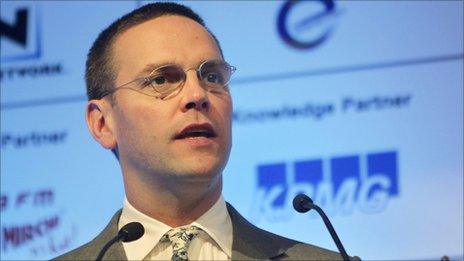Three Murdochs - all with something to prove
- Published
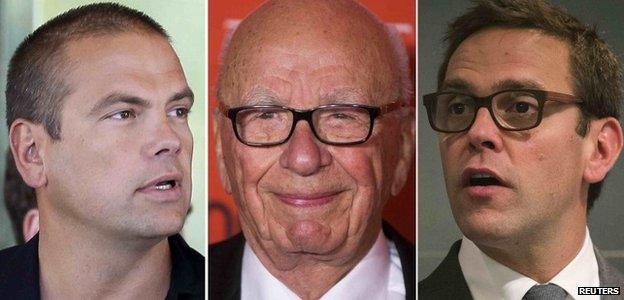
Lachlan, Rupert and James Murdoch
The words on my Twitter timeline were: "Rupert Murdoch is stepping down." You click on that one.
More fool me.
This much is true: Rupert Murdoch will from 1 July 2015 cease to be chief executive of 21st Century Fox and is handing that responsibility to his son James. He is also making his other son, Lachlan, executive co-chairman. Lachlan is currently co-chairman.
Murdoch-watchers enjoy analysing these subtle shifts in power and family dynamics. But let's be clear here, Mr Murdoch Sr remains chairman of both 21st Century Fox and the sister company, News Corporation. He is not heading off to the golf course.
Take the recent announcement of the renewal of the contract of Fox News chairman, Roger Ailes. Mr Ailes will, we are told, report to James, Lachlan and Rupert.
Also, check out Mr Murdoch's Tumblr, external. (Really, do click - it's fascinating.) This is not a man wanting to be seen as winding down.
The person "stepping down" is Chase Carey. The extravagantly moustachioed number two has been seen as the market-friendly counterpoint to the buccaneering Rupert. And although his day-to-day role is changing, he will, we are told, remain close to the centre of power and a reassuring presence for certain investors. So, "stepping down" a bit.
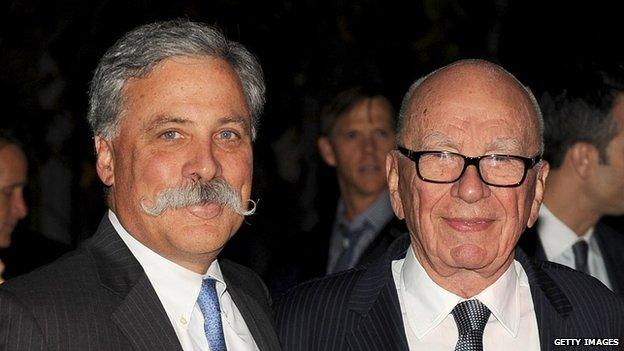
Chase Carey - the market-friendly counterpoint to the buccaneering Rupert
So, why does this matter? The best explanation came in a recent conversation with the head of the world's biggest marketing and advertising company, WPP, Sir Martin Sorrell. (Another supercharged media boss). Discussing global media businesses, he said: "Essentially, that means Rupert."
We may, naturally, think that the big tech companies such as Google, Apple and Amazon are the driving force in global media - but in terms of reach, content and subscribers, the Murdoch empire is still a huge power.
It may still print words on paper and sell subscriptions to watch television, but it would be wise to avoid the temptation to treat this as a decaying old media enterprise.
The share price has more than doubled in the past five years (at a time when it was forking out more than £300m to pay for the trouble caused by phone hacking).
The huge growth in the market for TV drama and video content in general reflects a feeling that the next frontier is the four or five hours a day we spend watching television.
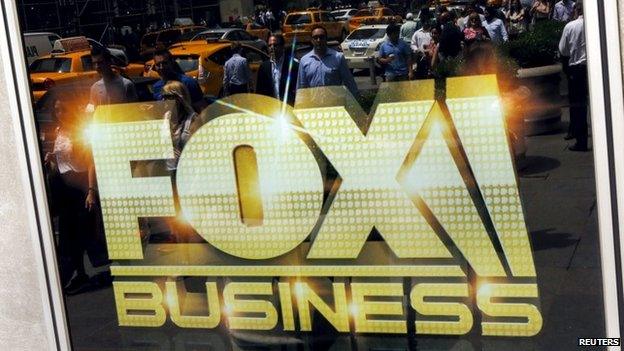
Fox Business - one of the many strands of the Fox Entertainment Group division of 21st Century Fox
Technology is changing how we have it delivered to our homes, but the money is in who makes and owns the winning content, and the Murdoch business is all about understanding how to entertain people.
The modern tabloid newspaper is in many ways his creation. He went in to television early and immediately grasped the power of buying American programmes in bulk. He spotted how football might drive pay TV in Britain, how there was a conservative gap in the American market for TV news.
Investors accept the Murdoch power (he owns only 12% of the shares but has about 40% of the votes) because he has been right so many times.
And, right from the beginning in Adelaide, he has shown he is entirely unafraid of risk when it comes to going into battle. That personal magnetism is the glue holding it all together.
Now that the dramas and costs of phone hacking ("UK newspaper matters" is the code used in all the corporate documentation) and the corporate restructuring have been largely resolved (along with the divorce from the third Mrs Murdoch) there is a feeling that it may be time for a big deal.
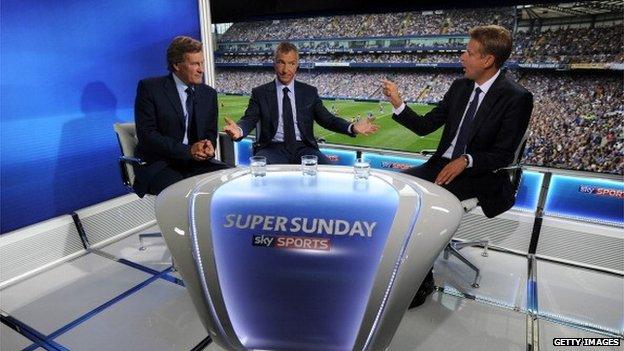
Rupert Murdoch spotted Premier League football as the money-spinner it is today
Might he sell Sky? There is interest from Vivendi and Vodafone. Also, he tried for Warner in the 1980s and tried again with a bid for Time Warner in 2014. Third time lucky?
James, meanwhile, has been saying that he feels India is the big opportunity.

The Murdoch empire
Rupert Murdoch, 86, inherited the family business, News Limited, when he was 21, after his father's death, and built it into a successful newspaper group in Australia. Entered the UK market in 1968, buying the News of the World, and later acquired the Sun, the Times and the Sunday Times. Introduced satellite TV service Sky (now BSkyB). Bought the US film studio 20th Century Fox in 1984.
In the wake of the phone-hacking scandal involving its UK newspaper business, News Corporation, the media empire he had built up was officially split into two in 2013: the entertainment arm, 21st Century Fox, and the publishing arm, News Corp.
James Murdoch, 42, was previously chief executive of BSkyB before heading News Corporation's operations in the UK, Europe and Asia. Later served as executive chairman of the newspaper arm, News International, before quitting in 2012 after the phone-hacking scandal. Last year, he was appointed co-chief operating officer at 21st Century Fox and has now stepped up to the chief executive role.
Lachlan Murdoch, 43, served as an executive at News Corporation before abruptly leaving in July 2005 to focus on his own investment businesses. In 2014, he returned to the fold, as co-chairman of News Corp and 21st Century Fox. As executive co-chairman at Fox, along with his father, he will effectively be James's boss.

However, when Rupert Murdoch does finally relinquish control, it will mark a deep cultural shift in the business he created.
There is an excellent story in William Shawcross's biography of Mr Murdoch in which he describes a dispute with his printers over turning the Sun into a tabloid.
The printers said it could not be done. Mr Murdoch took off his jacket, climbed on to the printing press and picked up an oily bar that was lying in a rag.
This was the solution - the presses had originally been supplied with bars that could fold the pages to tabloid size - and the printers' bluff had been called.
Printers ink was in his blood, he understood everything about the business of newspapers.
The person who follows him will almost certainly not share that enthusiasm.
However, while ink on paper may be a business in decline, selling news and entertainment is not - it's just being sold and delivered in a different way.
Investors will want to know if the younger Murdochs have a convincing argument about how to turn the content they own into cash in such a fast-changing business.
So, if you are wanting a clear answer as to who is going to take over after Rupert, we do not have it yet.
However, three Murdochs - all with something to prove - keep watching.
- Published16 June 2015
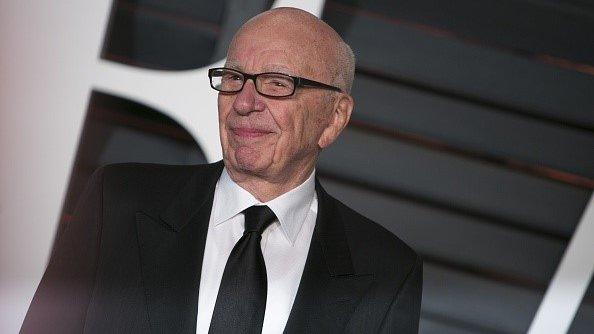
- Published11 June 2015

- Published10 December 2024
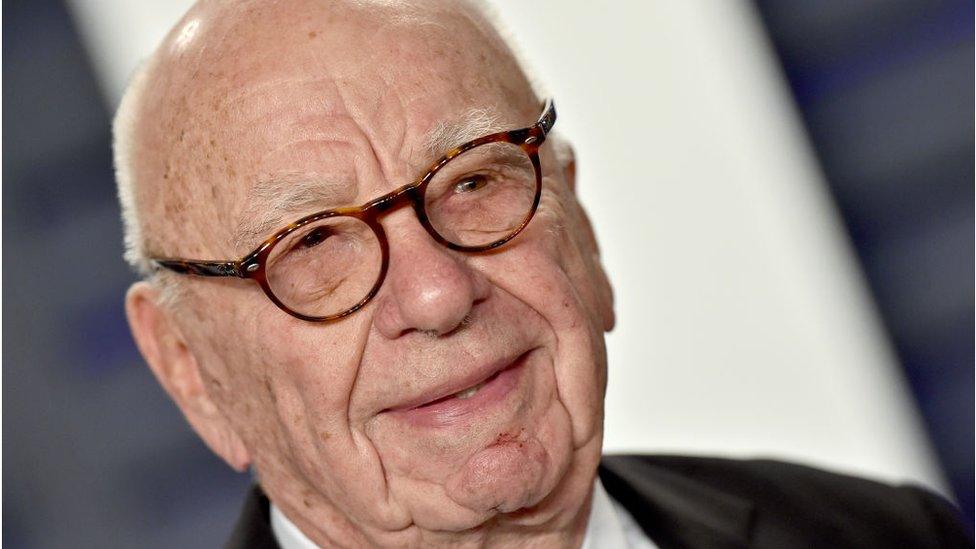
- Published20 September 2012
